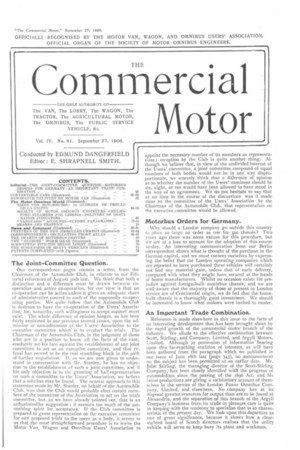The Joint-Committee Question.
Page 1

If you've noticed an error in this article please click here to report it so we can fix it.
Our correspondence pages contain a letter, from the Chairman of the Automobile Club, in relation to our Editorial references of August 3oth last. We think that both a distinction and a difference must be drawn between cooperation and active co-operation, for our view is that no co-operation can be active unless it gives an adequate share of administrative control to each of the supposedly co-operating parties. We quite follow that the Automobile Club is desirous to have the co-operation of the Users' Association, for, naturally, such willingness to accept support must exist. The whole difference of opinion hinges, as has been fairly explained in our previous several issues, upon the admission or non-admission of the Users' Association to the executive committee which is to conduct the trials. The Chairman of the Automobile Club, in the judgment of those who are in a position to know all the facts of the case, resolutely set his face against the establishment of any joint committee to act as an executive committee, and that refusal has proved to be the real stumbling block in the path of further negotiation. If, as we are now given to understand in conversation with Mr. Stanley, he has no objection to the establishment of such a joint committee, and if his only objection is to the granting of half-representation on such a committee to the Users' Association, we believe that a solution may be found. The nearest approach to this statement made by Mr. Stanley, on behalf of the Automobile Club, was that the Club would probably elect certain members of the committee of the Association to act on the trials committee, hut, as we have already pointed out, that is an unbusinesslike suggestion : it savours too much of the patronising spirit for acceptance. If the Club committee is prepared to grant representation on the executive committee for any proposed trials to the users as a body, it seems to us that the most straightforward procedure is to invite the Motor Van, Wagon and Omnibus Users' Association to appoint the necessary number of its members as representatives: co-option by the Club is quite another thing. Although we believe that, in view of the undivided interest of the Users' committee, a joint committee composed of equal numbers of both bodies would not be in any way disproportionate, we scarcely think that a difference of opinion as to whether the number of the Users' nominees should be six, eight, or ten would have been allowed to have stood in the way of an agreement. We do not hesitate to say that at no time in the course of the discussions was it made clear to the committee of the Users' Association by the Chairman of the Automobile Club, that representation on the executive committee would be allowed.
Motorbus Orders for Germany.
Why should a London company go outside this country to place so large an order as one for soo chassis? Two years ago there was some excuse for this procedure, but we are at a loss to account for the adoption of this course to-day. An interesting communication from our Berlin correspondent shows what is thought of the purchase in the German capital, and we must content ourselves by expressing the belief that the London operating companies which are reported to have purchased these vehicles will certainly not find any material gain, unless that of early delivery, compared with what they might have secured at the hands of home manufacturers. Whilst no occasion exists for prejudice against foreign-built motorbus chassis, and we are well aware that the majority of those at present in London service are of Continental origin, we do feel that the homebuilt chassis is a thoroughly good investment. We should be interested to know what makers were invited to tender.
An Important Trade Combination.
Reference is made elsewhere in this issue to the facts of an interesting development that has been brought about by the rapid growth of the commercial motor branch of the industry. We allude to the effective combination between Scott, Stirling, and Company, Limited, and Argyll Motors, Limited. Although in possession of information bearing upon this far-reaching coalition of interests, as will have been gathered from the paragraph which, we published in our issue of June 28th last (page 343), no announcement on the subject has been permitted at an earlier date. Mr. John Stirling, the managing director of the Scott-Stirling Company, has been closely identified with' the progress of automobilism since the passing of the 1896 Act, and his latest productions are giving a satisfactory account of themselves in the service of the London Power Omnibus Company, Limited, and elsewhere. No company has at its disposal greater resources for output than are to be found at Alexandria, and the separation of this branch of the Argyll Company's business from its trade in pleasure cars is quite in keeping with the tendency to specialise that is so characteristic of the present day. We look upon this departure as one of great significance, because it shows how a clearsighted board of Scotch directors realises that the utility vehicle will serve to keep busy its plant and workmen.


























